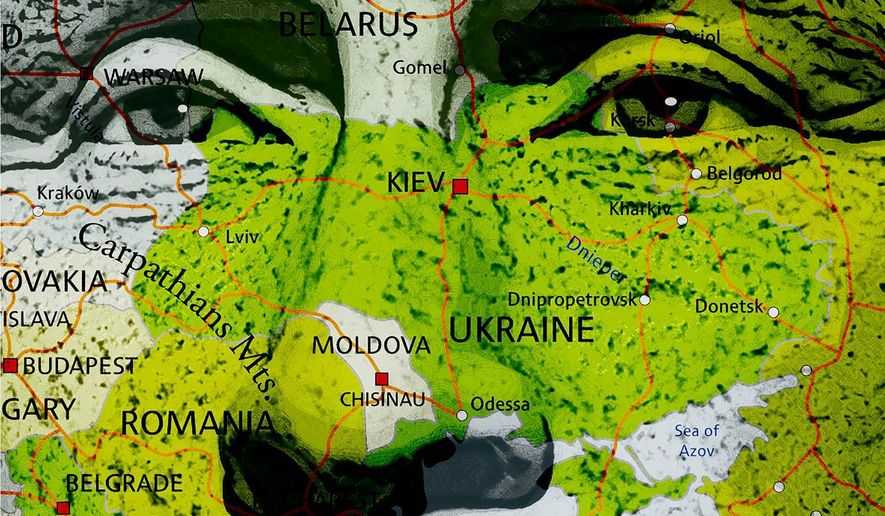OPINION:
According to President Vladimir Putin’s press spokesman, Russia is massing troops on Ukraine’s border solely to protect its citizens against a potential war in eastern Ukraine.
Alleging Kyiv was targeting pro-Russian civilians in eastern Ukraine with the “threat of massacre,” Kremlin mouthpiece Dmitry Peskov argued the Ukrainian military was to blame for the recent “escalation of provocative actions” that have set off alarm bells in Washington and Brussels. Russia’s state-controlled television predictably blamed Ukrainian President Volodymyr Zelenskiy for the crisis, called for the “de-nazification” of Ukraine, and claimed Ukraine, with support from NATO, was deploying overwhelming military force to the conflict zones in the east.
But contrary to Mr. Peskov’s outlandish allegations, it is Russia that is the aggressor and Ukraine clearly the aggrieved party, with direct consequences for the United States.
Mr. Putin’s KGB past makes him a natural and all-too-frequent purveyor of lies and disinformation. In a throwback to the same reasons Hitler used to annex Czechoslovakia’s Sudetenland, Mr. Putin is justifying Russia’s military pressure campaign against Ukraine as upholding the principle of self-determination for eastern Ukraine’s ethnic Russian majority.
Mr. Putin is dialing up the pressure in the Donbas region, where Russian-backed separatists have been battling the Kyiv government for seven years, violating numerous cease-fire agreements in the process.
Moscow, it should be noted, ruthlessly violated Ukraine’s territorial integrity by annexing Crimea in 2014, launched a series of destructive cyber attacks against Ukraine’s government ministries, businesses and electric power grid, and seized Ukrainian vessels and sailors in the Kerch Strait in 2018.
The Biden administration noted last week that Russia has more troops on the border with Ukraine than at any time since 2014.
Striving to build a functioning democracy with sizable Russian-speaking population and hoping one day to join both the European Union and NATO, Ukraine is a threat to Mr. Putin’s concept of regime security.
Facing an economy reeling from the drop in global demand for hydrocarbons, a mismanaged COVID-19 response and opposition leader Alexei Navalny’s populist uprising, Mr. Putin does not want Ukraine to serve as a beacon of inspiration for his domestic opponents, who are denied such basic civil liberties as freedom of expression and assembly.
U.S. intelligence agencies, in close coordination with the Defense and State Departments, are now on the hook to assess just what is Mr. Putin’s endgame here.
Russian parliamentary elections will be held by September. If past is prologue, Mr. Putin will seek to whip up nationalist fervor, portraying Russia as a besieged fortress under threat from NATO and Ukrainian “fascists,” a fortress only he and his allies can defend.
Mr. Putin may be seeking a permanent Russian force in Donbas, ostensibly for peacekeeping but in fact to freeze the conflict in place and take Ukrainian membership in the EU and NATO forever off the table. A side benefit for Mr. Putin would be demonstrating to Ukraine that the West is an unreliable ally with no real leverage in Moscow’s traditional sphere of influence. Mr. Putin has shown a willingness to endure U.S. and Western sanctions when he feels his regime’s existential interests are at stake.
The Russian president might also be eyeing a link between an occupied Donbas and an annexed Crimea to create an overland transport route, given the limitations of the Kerch Strait bridge.
The U.S. can’t even rule out the possibility that Mr. Putin is planning an all-out invasion of Ukraine, once considered the bread basket of the old Soviet Union.
Emphasizing America’s “unwavering commitment to Ukraine’s sovereignty” during a phone call with Mr. Putin, President Biden exhorted Russia to dial down tensions and proposed a summit. But the Pentagon’s decision to cancel plans for two warships to transit the Black Sea only risks emboldening Mr. Putin. Mr. Zelenskiy has just requested a summit with Mr. Putin, but has thus far received no response.
To be blunt, Ukraine is under siege. Mindful that sanctions have never induced a change in Mr. Putin’s calculus or behavior, the Biden administration is running out of time to draw and enforce a red line, with real military, diplomatic and economic measures to deter Russian aggression. A recent White House aspirational statement of “building a stable and predictable relationship with Russia that is consistent with U.S. interests” doesn’t change the equation.
Kyiv is on the front lines of defense against Russian espionage, military, cyber and economic attacks. How the Biden administration responds will say a lot about its Russia policy and commitment to Ukraine, which gave up its nuclear weapons in return for Russian guarantees of its territorial integrity just after the Cold War ended.
NATO members, especially the Baltic states which border Russia, are watching and waiting for the next U.S. move. Mr. Putin is arguably at his most dangerous and unpredictable right now, precisely because he is weakened politically and more vulnerable at home than ever before.
• Daniel N. Hoffman is a retired clandestine services officer and former chief of station with the CIA. His combined 30 years of government service included high-level overseas and domestic positions at the CIA. He has been a Fox News contributor since May 2018. Follow him on Twitter @DanielHoffmanDC.




Please read our comment policy before commenting.